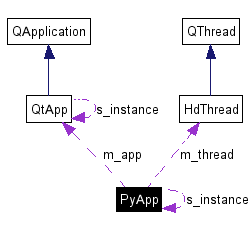
#include <PyApp.h>
Collaboration diagram for PyApp:

Matthew Langston <langston@slac.stanford.edu>
Definition at line 30 of file PyApp.h.
Public Member Functions | |
| PyCanvas * | currentCanvas () |
| Returns a pointer to the current CanvasWindow. | |
| int | exec () |
| Starts the QApplication event loop. | |
| void | lock () |
| void | openDocument (const std::string &filename) |
| Opens a new document from file filename. | |
| PyApp (int) | |
| A constructor that created QtApp without threading. | |
| PyApp () | |
| The default Constructor. | |
| void | quit () |
| Terminates the application. | |
| void | unlock () |
| ~PyApp () | |
| The destructor. | |
Static Public Member Functions | |
| static PyApp * | instance () |
| Returns the application instance. | |
Private Attributes | |
| QtApp * | m_app |
| The QApplication object. | |
| HdThread * | m_thread |
| The thread in which to run the GUI. | |
Static Private Attributes | |
| static PyApp * | s_instance = 0 |
| The instance of the application. | |
|
|
The default Constructor.
Definition at line 102 of file PyApp.cxx. References QtApp::currentCanvas(), QApplication::hasPendingEvents(), QtApp::instance(), m_app, m_thread, s_instance, QThread::start(), QApplication::startingUp(), and QThread::wait(). Referenced by instance(). |
|
|
A constructor that created QtApp without threading.
Definition at line 131 of file PyApp.cxx. References m_app. |
|
|
The destructor. Kills the application object running in the thread. |
|
|
Returns a pointer to the current CanvasWindow.
Definition at line 166 of file PyApp.cxx. References QtApp::currentCanvas(), QApplication::lock(), m_app, and QApplication::unlock(). Referenced by hippodraw::Python::export_HDApp(). |
|
|
Starts the QApplication event loop.
Definition at line 154 of file PyApp.cxx. References QApplication::exec(), and m_app. Referenced by hippodraw::Python::export_HDApp(). |
|
|
Returns the application instance.
Definition at line 145 of file PyApp.cxx. References PyApp(), and s_instance. Referenced by hippodraw::Python::export_HDApp(). |
|
|
Definition at line 187 of file PyApp.cxx. References QApplication::lock(), and m_app. Referenced by hippodraw::Python::export_HDApp(). |
|
|
Opens a new document from file filename.
Definition at line 177 of file PyApp.cxx. References QApplication::lock(), m_app, and QApplication::unlock(). Referenced by hippodraw::Python::export_HDApp(). |
|
|
Terminates the application.
Definition at line 161 of file PyApp.cxx. References m_app. Referenced by hippodraw::Python::export_HDApp(). |
|
|
Definition at line 191 of file PyApp.cxx. References m_app, and QApplication::unlock(). Referenced by hippodraw::Python::export_HDApp(). |
|
|
The QApplication object.
Definition at line 38 of file PyApp.h. Referenced by currentCanvas(), exec(), lock(), openDocument(), PyApp(), quit(), and unlock(). |
|
|
The thread in which to run the GUI.
Definition at line 41 of file PyApp.h. Referenced by PyApp(). |
|
|
The instance of the application.
Definition at line 100 of file PyApp.cxx. Referenced by instance(), and PyApp(). |
 1.4.3
1.4.3